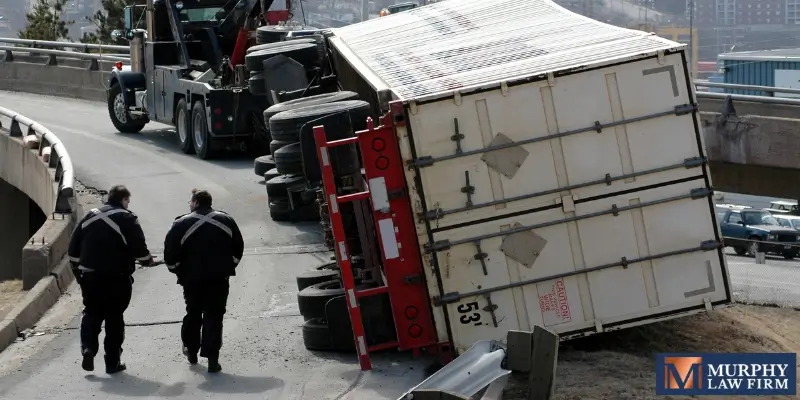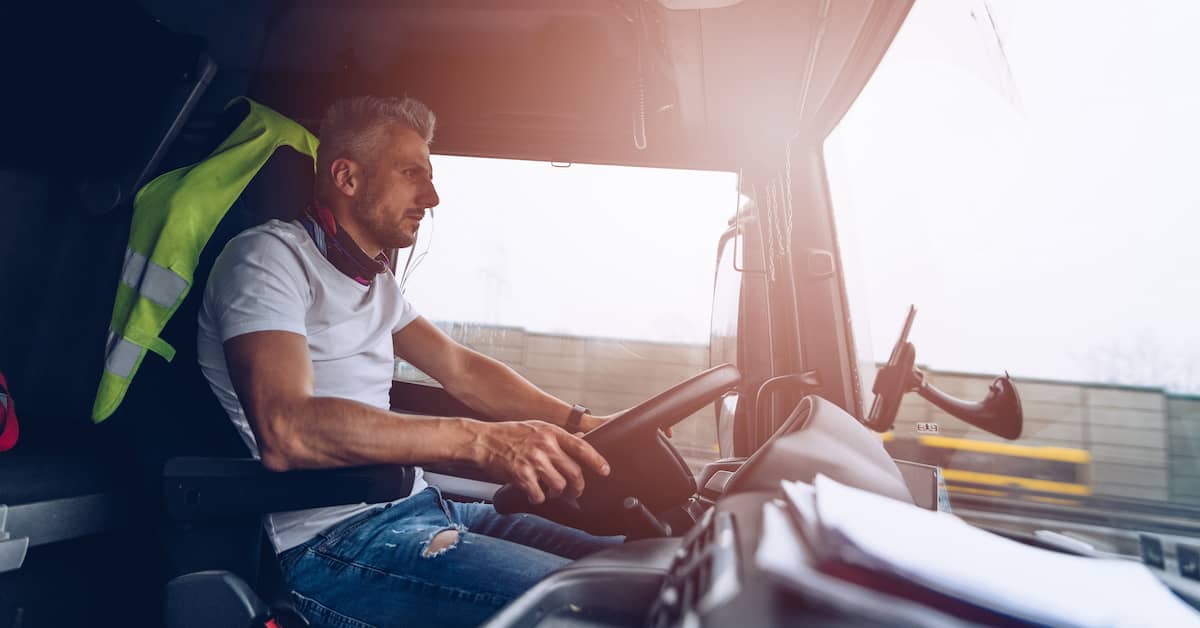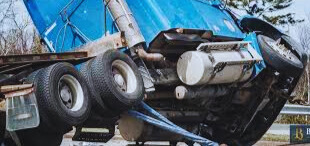Best Commercial truck accident lawyer
Best Commercial truck accident lawyer Crashes involving trucks and 18-wheelers happen every day, and the severe injuries that often result can leave innocent drivers and passengers facing stacks of medical bills, lost wages, and lingering pain and suffering.
Accidents involving delivery trucks, semi-trailers, tractor-trailers, tow trucks and other commercial vehicles often result in more severe injuries than collisions involving passenger vehicles. You are likely wondering who is responsible for paying your medical expenses if you’re injured in a trucking accident. Determining liability is complex as the driver, the trucker’s employer, and the truck’s manufacturer may all share responsibility. You should hire a truck accident lawyer if you suffered injuries in a collision with a commercial truck. Here is everything you need to know about truck accidents, including the most common causes of commercial trucking collisions, actions to take after a crash, and the type of compensation you may receive.

Truck Accident Statistics
The National Highway Traffic Safety Administration defines large trucks as any medium or heavy truck weighing more than 10,000 pounds. The NHTSA includes all commercial and non-commercial vehicles besides buses and motor homes in its statistics, but most legal cases involve commercial trucks such as big rigs, 18-wheelers, tanker trucks, and dump trucks. In 2019, more than 5,000 people were killed in crashes involving large trucks. More than 75% of these fatalities were occupants of other vehicles.
It is important to note that truck drivers involved in fatal crashes in 2019 were less likely than passenger vehicle drivers to have previous driving problems such as tickets, suspensions, or revocations. While many truckers are careful drivers who undergo extensive training, the complexity of operating these large vehicles often contributes to accidents.
Truck Injury Lawyers
A fully loaded tractor-trailer can weigh over 80,000 pounds. Other drivers must use special caution when sharing the road with them since the significant size disparity between these enormous vehicles and the typical car is dangerous.
Colliding with a vehicle 20 times larger than a typical car can lead to serious harm. In 2020, there were 4,842 instances where large trucks were involved in fatal accidents. In the same year, some 107,000 trucks were part of accidents causing injuries, according to the Federal Motor Carrier Safety Administration.
Truck injury lawyers can help victims receive compensation for their injuries. The following are among the most common types of injuries drivers experience in large truck accidents.
Injuries to the head and neck
Several different kinds of problems can happen with the head and neck. Conditions caused by an accident can vary from a mild concussion or bump on the head to serious traumatic brain injury.
When a car collides, the people inside might feel their heads snap forward and backward, causing whiplash.
Truck accident victims could also have bones in the spine break or move out of place. Even the discs between the bones can get torn or burst.
Damaged bones
In truck accidents, bones frequently fracture or become crushed because of the powerful impact. The force of a collision can lead to fractures, which means the bones can crack or break. Sometimes, the muscles and nerves close to the broken bone can also be harmed, causing additional problems.
Lacerations, cuts, and burns
Truck accidents commonly cause burns, cuts, and lacerations. If the fuel lines in a truck break open during the accident, it can trigger a fire. Burns are a major concern, often resulting from such fires and being counted among the most common auto accident injuries.
Treating burns can pose significant challenges and expenses due to the potential for scarring, damage to nerves, loss of limbs, and other physical harm.
The force of the accident can cause the glass to shatter and fly around, leading to cuts and deep wounds on the skin, known as lacerations. These lacerations can be especially costly to treat on the face. Such injuries may require specialized medical attention.
Internal bleeding
An accident with a truck can result in internal bleeding. This can occur when a seat belt, airbag, or another object strikes the body forcefully.
Inside your body are vital structures like the aorta and the spleen. Due to the intense impact of the accident, these structures can rupture or break. Additionally, important organs and ribs can sustain damage.
The consequences of internal bleeding are grave. Your heart might cease functioning, leading to cardiac arrest. In certain instances, internal bleeding can even lead to death.
These are only some of the injuries from a truck accident that can cause intense pain and large medical costs. A truck injury lawyer can help you secure the fair compensation you deserve for your injuries.
Common Causes of Truck Accidents
Unfortunately, truck accidents are common because of the complexity associated with operating these large vehicles. While trucker error is typically the leading cause of accidents, other reasons include fatigue, substance use, passenger vehicle error, or equipment problems.
1. Trucker Fatigue and Substance Use
Truckers must adhere to strict schedules and often skip vital breaks to complete deliveries on time. While federal and state laws require drivers to rest during long shifts, these rules are not always adequately enforced. Operating a commercial truck while drowsy can lead to many problems, including impaired judgment, reduced control, and decreased reaction times. Some studies even show that drowsy driving is as dangerous as operating a vehicle while intoxicated.
Unfortunately, truckers sometimes drive under the influence of alcohol or drugs. While federal regulations require trucking companies to perform random drug tests, this is not always enough to stop intoxicated driving. Commercial drivers must also adhere to stricter blood alcohol level regulations. Truckers are too drunk if their blood alcohol level is higher than 0.04%. The alcohol limit for passenger vehicle drivers is 0.08%. Truckers caught driving with too much alcohol in their systems often lose their licenses.
2. Truck Driver Errors
Driver error is a significant problem in the commercial trucking industry because simple miscalculations can have catastrophic consequences because of the size of these vehicles. The most common driver errors include speeding, failing to monitor bind spots properly, and driving too fast around curves.
3. Equipment Problems
Commercial trucks are complex machines that require consistent maintenance to perform correctly. Mechanical failure is still a threat, even if mechanics perform the proper safety checks and maintenance. The most common mechanical problems include:
- Neglecting to maintain the brakes properly
- Failing to load or secure delivery cargo properly
- Failing to address steering issues
- Neglecting to maintain and replace tires properly
Further, manufacturing or design errors such as defective tires or malfunctioning warning lights can also collide.
Other causes of commercial truck collisions include inclement weather conditions, traffic light outages, and defective road designs or maintenance.
Federal Trucking Laws
Drivers must follow federal trucking regulations if they are driving on interstate roads or highways. Title 49 of the U.S. Government’s Code of Federal Regulations outlines most laws. The CFR outlines laws for truck owners, carriers, drivers, and maintenance workers. These laws help determine liability in commercial truck accidents.
For example, federal regulations outline the number of drivers’ breaks during regular shifts. Truckers can only work for 14 consecutive hours, and they can only drive for 11 of those hours. All drivers must rest for ten straight hours before beginning a long shift, and they cannot work for more than 60 hours over seven days. Drivers must also maintain detailed logbooks.
The DOT establishes safety rules, while the FMCSA is responsible for preventing injuries by enforcing rules. Many federal agencies enforce these laws, including the Federal Motor Carrier Safety Administration and the U.S. Department of Transportation. These agencies also require truckers or the companies they work for to carry insurance coverage. The amount of coverage depends on the type and weight of cargo transported.
State Trucking Laws
Truckers must follow state rules when driving on intrastate roads. They are subject to the laws of each state and need to follow them, just like passenger vehicle drivers. States have the freedom to set their own rules, but regulations typically establish sleep requirements and speed limits. It is essential for truckers who regularly operate between states to understand the various rules in the places they travel.
Truck Accident Liability
One of the most challenging aspects of any truck accident case is establishing liability. You may file a civil suit against the at-fault driver in traditional passenger vehicle accidents and file an insurance claim. However, many parties can share responsibility in trucking accidents, including:
- Trucker drivers
- Employers
- Truck owners
- Cargo owners
- Cargo loaders
- Truck maintenance companies
- Trucker maintenance workers
However, not every accident involves all of these parties. Some drivers are independent operators and lease their vehicles from a third-party entity instead of employer trucks.
1. Truck Driver Liability
Most truckers are experienced, licensed individuals who do their best to follow state and federal trucking regulations. However, circumstances that a trucker cannot control may lead to a collision. These situations include inclement weather, road hazards, heavy traffic, and faulty road signs. However, there are instances when driver error or negligence causes a crash. Drivers must follow sleep rules and share responsibility for a collision if they drive for too long without taking a break.
You may have a valid claim if the trucker in your case was careless or did not follow the applicable federal or states laws. You also want to consider the liability of other parties, including the driver’s employer or the cargo shipper.

2. Driver Employer Liability
Truck employers may share responsibility if one of their workers causes an accident. Under a federal legal theory, an employer can share liability if the trucker was working for the organization’s benefit at the time of the accident. In other words, companies are responsible for the actions of legal employees who cause an accident while on duty.
However, employers often try to skirt liability by claiming drivers are independent contractors or that they were off duty at the time of the crash.
3. Cargo Loader and Shipper Liability
Truckers often transport cargo on behalf of third-party entities. If a worker of an outside agency improperly secured the cargo, that entity can share responsibility for the accident. For instance, a heavy load requires good straps and tie-down equipment to ensure items do not become loose during transport. Falling objects can cause serious accidents, and the cargo loader would likely share responsibility in such an instance.
4. Truck and Parts Manufacturer Liability
The breakdown could be due to poor maintenance, design, or manufacturing processes if a truck part fails. The manufacturer or distributor might share liability in design or production flaws, while repair workers and companies can have liability if the truck was improperly maintained.
5. State Government Liability
The local state government can also share liability if a road design flaw or maintenance issue contributed to a truck crash. For instance, if broken pavement or an improperly placed hazard sign is the cause of the collision, the local county board could share responsibility. Cases placing blame on government agencies are tough to prove. You must seek the advice of an attorney before attempting to prove liability in such a case.
What To Do After a Commercial Truck Accident
Colliding with a large truck is a traumatic experience. If you do not suffer immediate injuries, anger or shock may prevent you from acting rationally after the accident. However, you must compose yourself and seek the proper medical treatment if needed. If you do not need to see a doctor, here is what you should do before leaving the crash site:
- Talk to other passengers and to the trucker to assess any injuries.
- Notify the police and the proper emergency authorities of the crash circumstances.
- Collect the trucker’s information, including employer data, personal details, and vehicle information. Ask if the driver owns the truck, is an employee of a trucking company, or uses a leased commercial vehicle.
- Take photos of the scene, including truck signage, car damage, passenger injuries, and the surrounding environment.
- Note certain aspects of the scene, including the location, time of day, road conditions, and weather elements.
- Collect contact information for any witnesses at the scene.
Keep in mind that seeking medical attention is the most crucial step. It is often best to go to the hospital, even if you do not have visible injuries. Some injuries do not present symptoms for several days, and you may not feel any pain because of the adrenaline associated with the crash.
1. Speak To a Lawyer
It is within your rights to retain legal counsel after a truck accident. Lawyers understand trucking laws and can help you establish liability. A legal team will also assist you in building a case and completing the steps outlined belowBest Commercial truck accident lawyer
2. Gather Evidence
Truck accidents are complex because of the potential number of parties involved. It is often necessary to gather evidence to prove liability. Your lawyer can help you gather evidence such as medical records, police reports, crash scene photos, and witness statements.
You will need more detailed evidence if you decide to file a personal injury lawsuit. You will need to gather information from government agencies, law enforcement agencies, insurance companies, and the trucker’s employer. Your legal team can help you understand what evidence to collect and how to present it to the courts.
3. Gather Data from Government Entitles
Federal and state laws require truckers, employers, and vehicle inspectors to maintain detailed inspection reports, logbooks, and maintenance records. While this information is sometimes in the official crash report, you may need to solicit this data yourself. Your lawyer can help you determine which agencies to contact and how to organize and analyze this data to support your New Jersey truck accident claims correctly.Best Commercial truck accident lawyer.Best Commercial truck accident lawyerTrucking Accident Personal Injury Compensation
If you’re injured in a commercial trucking accident, you may receive the following compensation:
- Economic compensation: Most insurance companies and courts award monetary damages to pay for hospital stays, surgical procedures, doctor’s visits, and rehabilitation expenses. This compensation can also cover lost wages, diminished earning capacity, and property damage.
- Noneconomic compensation. Severe injury victims may receive noneconomic compensation to cover pain and suffering or emotional stress.
- Punitive damages. This type of compensation is only awarded in a handful of cases but is meant to punish the negligent actions of a trucker, employer, or maintenance company. Punitive damages are often hard to prove and many New Jersey truck accident lawyers do not even gather evidence for such damages. It is often up to the judge to decide whether or not to award these damages.
The amount of money you may receive depends on the cause of the accident, the extent of your injuries, and the cost of your medical care. The quality of your case and the amount of evidence you present can also impact the amount of compensation you receive.
LAWYERS HELPING NEW JERSEY TRUCK ACCIDENT VICTIMS
At Judd Shaw Injury Law™, we are guided by a set of core values that defines every action we take on behalf of our clients, every day. We call it the Judd Shaw Way. This set of promises to you ensures that you receive the highest possible level of service throughout every step of the legal process. If you or someone you love was injured in an accident with a truck, contact our New Jersey truck accident lawyers today. We want to help.Best Commercial truck accident lawyer




